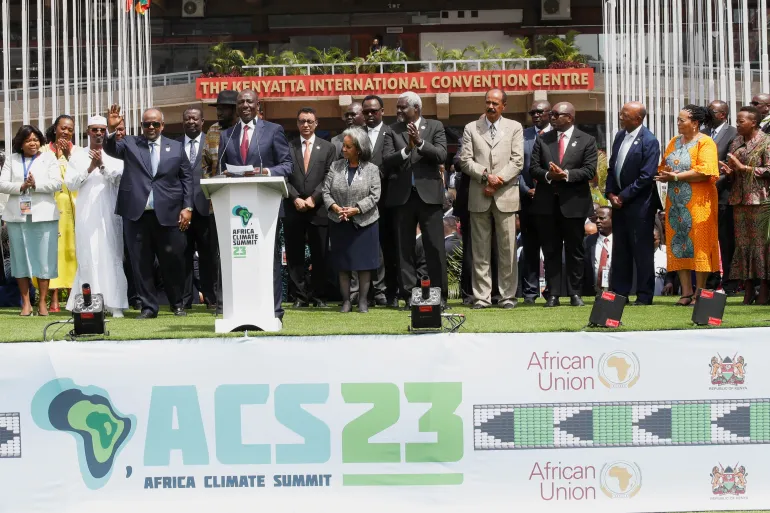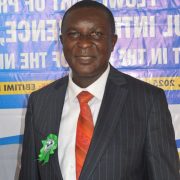Why Declarations at African Climate Summit are false solution- Friends of the Earth Africa offers Explanation

By Ekemini Simon
Friends of the Earth Africa (FoEA) , a collective of sovereign organisations working with grassroots communities on environmental and rights-based struggles in the African region, has described the recommendations from the African Climate Summit as a false solution to Africa’s climate crisis.
It could be recalled that the organisation had earlier recommended that African Leaders should firmly reject false ecological solutions at the submit.
However, analysis of the declaration from the submitted pointed to the prioritisation of carbon markets ideas.
In a position paper from the organization, arising from the Africa Climate Summit (ACS) in Nairobi, Kenya, held from 4th to 6th September 2023, Friends of the Earth Africa said the agenda of the summit was drafted by profit-driven organizations from the global North and laden with Carbon Markets ideas.
Yegeshni Moodley, Climate and Energy Justice Campaign Lead at Friends of the Earth South Africa noted that the climate week was missing the local voices that are most impacted by climate change.
She said their stories of hope, perseverance, suffering and disaster were glaringly absent, hidden away behind security barriers and military armament.
Moodley stated that the use of top-down, technocratic false solutions negates the
value of local knowledge and traditional practices that have sustained generations on their land.
She added ” We must decry and lament the situation Africa has been placed into, where her lands and riches are once again being sold away to the distress and poverty of her people.
“The declaration, which falls short of the expectations of the people and civil society organisations, is not a surprise, as the various dangerous clauses embedded in the document have revealed the truth to these concerns.
“The summit sessions hammered out the various ways to institutionalize carbon markets on the continent. This is a dangerous distraction from the much-needed rapid transition away from fossil fuels if we stay below 1.5 degrees.”
On her part, Anabela Lemos, Director, Justiça Ambiental, Mozambique said they were already worried that the agenda of the Summit had been influenced heavily by McKinsey and US corporate interests.
She pointed out that Africa is highly vulnerable to the ravages of the climate crisis, but it seems the voices of Africans are being ignored.
Lemos said instead of a people-based renewable energy system and strengthening peoples’ rights, Africans are seeing more fossil fuels and carbon markets, and they denounce these moves.
For Maimoni Mariere Ubrei-Joe, Coordinator of the Climate Justice, and Energy Program, Friends of the Earth Africa, existing policies in Africa can be effective if they are backed by concrete actions.
He insisted that Africa cannot keep using the same old extractivist model and expect a different result.
Ubrei-Joe said what should be Africa’s focus now is to stop the contributors to climate change at source and not look for shortcuts to keep extracting using the smokescreen of the carbon market, geoengineering, and other false solutions.
The Coordinator added “Africa must champion a people-led and centered Just energy transition to 100 per cent renewable energy with utmost care for the environment. African energy systems should be developed to meet the needs of the continent rather than thinking only of energy for export.
“Our energy sovereignty is paramount if we are to grow and move forward. This Nairobi declaration is short of these ideas and it could just be another beautiful document heading for the shelves.”
Tyler Booth, Friends of the Earth International Climate Justice and Energy Program Coordinator said Africa urgently needs scaled-up real climate finance solutions to enact a fair, just transition away from fossil fuels towards sustainable renewable energy.
She noted that at the forefront of Africa’s just transition must be the need to increase energy access and sufficiency across the continent.
Booth explained that the dash for Africa’s transition minerals cannot replicate the extractivist dirty energy model that puts profits over the people and planet nor can the extraction be led by neocolonial pursuits by the Global North.
The International Coordinator insisted that any exploitation of Africa’s critical mineral resources needs to recognize the rights of Africa’s indigenous people and local communities and ensure that their energy access needs are a priority in the transition.
She added ” Africa’s natural habitats and ecosystem must not be commodified and reduced to their role as carbon sinks, but recognized for the intrinsic value they have to ecosystems and the people who rely on these ecosystems functioning. Africa does not need carbon markets; it needs real climate finance”.
Booth insisted that the adoption of the language “phase down of coal” and no mention of the phase out of fossil fuels by declaration is a pointer to the value it places on the people of Africa who bear the brunt of the climate crisis.
Lending her voice, Mariann Oruwvuje, Friends of the Earth Africa, Food Sovereignty coordinator called on African leaders to meet their human rights obligations and listen to the requests of the affected communities and people.
She said Governments and intergovernmental organisations must immediately stop any policies, which lead to violations of the human right to food.
Oruwvuje added ” We demand public policies in favour of farmers’ seed systems.The Nairobi Declaration must prohibit monopolies, and favour instead agroecology, access to land, and good care of the soil.
” Farmers themselves are agricultural experts and they must be in the driver’s seat of agricultural development at all times! We must prioritize people over profits, and continue to promote and defend agroecology and farmers’ seeds, which represent the hope and future of humanity.”
In her contribution, Rita Uwaka, Forest and Biodiversity coordinator, Friends of the Earth Africa, said Africa should double its agricultural production and productivity with a focus on community-based and smallholder farmers’ agro-ecological systems, while supporting intra-African agricultural business between the people and the smallholder and community farmers, thus create spaces for knowledge sharing.
She added “We must stop the harmful expansion of monoculture plantations systems and related deforestation, watershed and soil degradation. Ensure that at least 30 percent of African land and at least 30 per cent of the African ocean and seas are conserved or protected by 2030; with a rights-based approach.”
Uwaka pointed out that Africans must support African leaders to stop any harmful carbon market laws that will violate the people’s rights, and aid livelihood losses and ecosystem destruction.







